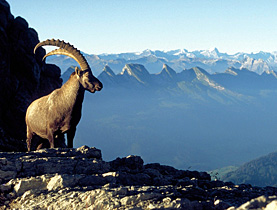
A century of conservation brings new challenges

Switzerland's largest conservation organisation, Pro Natura, turns 100 years old this year but the future holds big challenges with global warming and habitat loss.
The organisation, which started life in 1909 as the Swiss League for the Protection of Nature, said at a news conference in Bern on Thursday that it would continue to campaign on behalf of threatened species, landscape conservation and the preservation of natural treasures.
The organisation was set up to create Switzerland’s first national park in canton Graubünden. The Swiss National Park opened in 1914 and remains the country’s only national park.
However, one of the main tasks for Pro Natura is also to create and manage nature reserves throughout the country. There are more than 600 reserves in agricultural, urban and wilderness areas, and Pro Natura has helped establish half of all protected areas in Switzerland.
To mark the centenary, Swiss Post is to issue a special stamp featuring a European brown bear, designated by Pro Natura as animal of the year.
The bear was the organisation’s first mascot. Otto Sieber, Pro Natura’s general secretary, sees in it not only a “symbol of the fierceness and beauty of nature” but also a “symbol for the challenges in nature conservation”.
The fate of bears in Switzerland has shown one thing clearly: The challenges facing Pro Natura, which has campaigned for the re-introduction of brown bears in the country, are not easy.
Bears and tolerance
One bear named Lumpaz, also known as JJ2, came into the Swiss National Park in 2005 and caused a flurry of headlines before disappearing without trace after just one summer.
Its brother, JJ3, was shot and killed in April 2008 on the recommendation of the authorities because it had become habituated to humans.
The lack of tolerance among the population for the re-settlement of bears, lynx and wolves and the growing list of endangered animal and plant life are one thing. Battling climate change and increasing urban sprawl are other matters.
Switzerland is increasingly becoming a concrete and asphalt jungle, with a square metre of untouched ground being built on every second, according to Swiss authorities.
That makes the fight for nature conservation a complicated one, says Sieber.
“Now and again it can be frustrating,” he told swissinfo.
But before complaining, he added it is wise to look back at the accomplishments of the last 100 years.
Many achievements
Many achievements that are taken for granted today were made possible because of Pro Natura’s commitment.
The organisation helped create a constitutional article concerning moors and moor landscapes. It worked to help craft a law on watercourses and what the government must contribute to ecological agriculture.
Sieber points out that Switzerland was a pioneer with such contributions and the Swiss system was later taken up by the European Union.
Switzerland is densely populated and conflicts of interest to use what remains of the land are inevitable. But there are other special challenges for nature conservation in Switzerland.
“Federalism can stand in the way of progress when it comes to the protection of nature and the countryside,” Sieber said.
While national parks or regional nature parks are often created “with ease and swiftness” in neighbouring countries, this is only possible in Switzerland with the approval of the local population.
Second national park?
One example is the decade-long ongoing discussion on the creation of a second national park in Switzerland.
Pro Natura is optimistic that its commitment here, too, will pay off and has already handed in an application for the “Parco nazionale del Locarnese” in canton Ticino.
Pro Natura, much like the Nature Conservancy in the United States or the National Trust in Britain, often wages campaigns against the disappearance of intact landscapes by buying or managing them.
Financing comes from the sale of chocolate coins, donations and bequests. About 100,000 members and 30,000 donors support the group, as do many volunteers.
In many ways, though, the work is really just beginning.
“In a 100 years’ time,” Sieber said, “a loud voice for nature will still be needed, a voice that is not shouted by individual or economic interests but by people’s responsibility and the love of nature.”
swissinfo, Corinne Buchser and agencies
The organisation was founded in 1909 as the Swiss League for the Protection of Nature.
It was set up to create the Swiss National Park in canton Graubünden. Today Pro Natura still pays SFr1 per member for the park’s upkeep.
A 100-year jubilee book, “Die Stimme der Natur” (The Voice of Nature), will be published in April.
To celebrate the centenary, Swiss Post is issuing an 85-cent stamp featuring a brown bear, which will be valid from March 5.

In compliance with the JTI standards
More: SWI swissinfo.ch certified by the Journalism Trust Initiative






























You can find an overview of ongoing debates with our journalists here . Please join us!
If you want to start a conversation about a topic raised in this article or want to report factual errors, email us at english@swissinfo.ch.